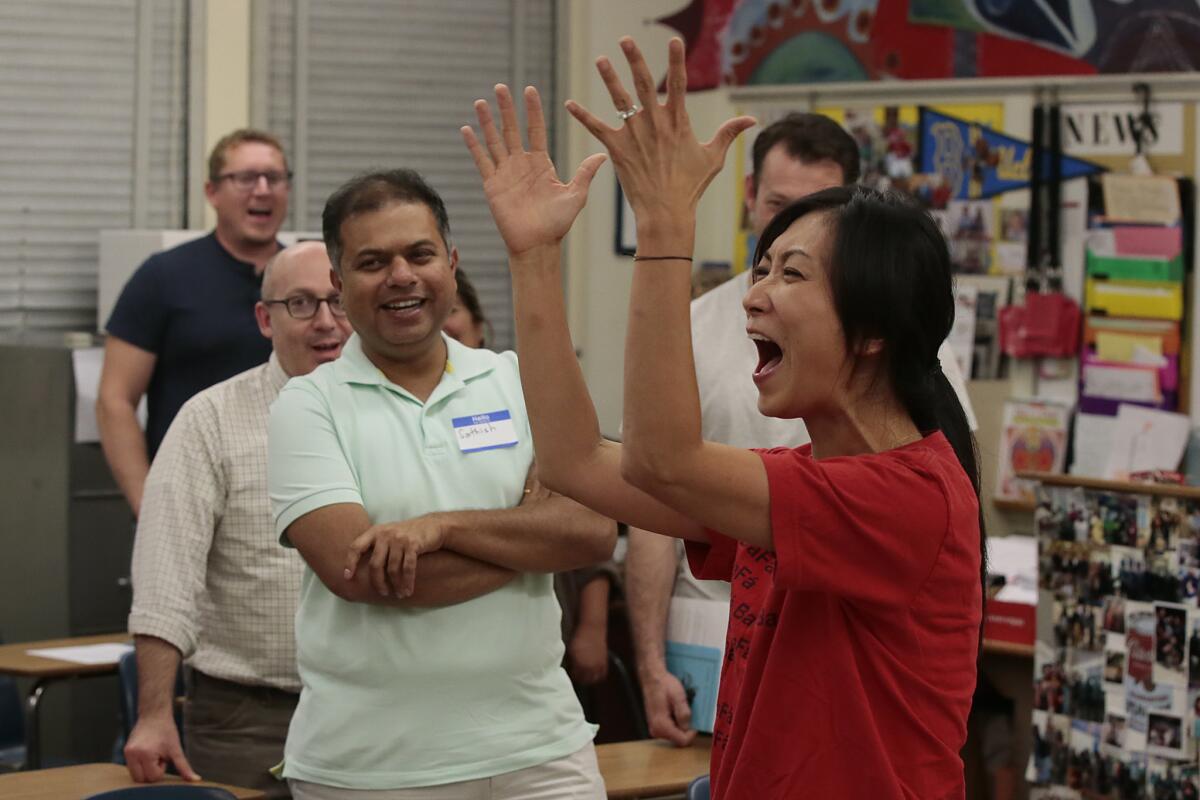Parents, do you know what your kids are actually doing in class?

High School social institutions teacher Grace Kim-Oh tries to energize parents as she explains a classroom exercise their children participate in at Cleveland Humanities Magnet School.
Meet the Alphans. They are a new society. Theirs is a warm, sharing culture, where intimacy not only is rewarded but required.
When you see a fellow Alphan, the parents at Cleveland Humanities Magnet High School learned, a handshake is an insult. You must hug. There is one man in charge, the women are deferential to the men and people talk only about their male relatives. Everyone laughs a lot.
âYou are all a member of the alpha culture,â ninth-grade social institutions teacher Grace Kim-Oh tells her class, at 7:30 p.m. on a Thursday.
The 22 parents stare at her. This is not what they were expecting.
They were at the school in Reseda for the âCORE Experience,â an annual fund-raiser during which teachers give current and prospective parents a taste of what their kids experience in class.
Many of the parents have children attending the school, while some are going through the magnet application process now, trying to find the best fit for their soon-to-be high-schooler. L.A. Unifiedâs magnet schools are themed schools open to all district students, but students who apply are selected through a lottery.
The parents thought theyâd sit for a lesson in social studies, maybe, or a rotating cycle of teachers telling them about classes. What they got instead was an interactive exercise that required them to role-play an entirely new culture, then send spies to observe a class role-playing a different culture, called Beta. They were to report back and try to figure out each otherâs cultures without knowing anything about the language or societyâs rules.
The touchy-feely code of Alpha made Tom Mar-Johnson, an Englishman and father to student Freya, 14, âextremely uncomfortable,â he said. That discomfort lasted about 10 minutes. Soon enough, he was hugging strangers and playing a new game with them, rattling a penny in his hand to win beans from his neighbors.
The exercise is one that freshmen do in the first week of school at the humanities magnet, which takes an interdisciplinary approach to teaching students in areas such as literature, history and cultural studies.
The goal of the practice became apparent only at the end, after the teacher collected all the parents â around 100 â and had them describe each otherâs cultures. In addition to more neutral descriptors, they used words such as âcreepy,â âxenophobic,â âcompetitiveâ and âzombies.â
After maybe an hour with their own groups and much less time observing the others, the parents already had fostered loyalties and made judgments.
That immediate prejudice, teachers said, is the lesson.
âWeâre really teaching the kids to critically think ⌠to check these biases,â teacher Marisa Del Pino told the parents.
This method of learning makes her child think more, said Tasnim Hussain, whose daughter Sarrah is a freshman. When Hussain was growing up in the U.K., learning about cultures often meant rote memorization and regurgitation.
Hussain and her husband, Fakhrudeen Hussain, were at the event to gain a better understanding of what their daughter is learning, and to grasp why she has two to four hours of homework every night, they said.
âI donât think I was taught in the same way,â Tasnim Hussain said. âIt really makes the kids question and think.â
Not everyone bought into the exercise. Maria Cruz left before the teachers explained the purpose at the end. On her way out, she said she was leaving early because she had to pick up her daughter Samantha, also a ninth-grade student at the school, from dance class. But she had asked a teacher about leaving earlier and said she was unimpressed with the exercise.
She understood the purpose of the class was to show students how to think about other cultures, which is something she and her family already focus on with her daughter. But she didnât enjoy this class.
âI wanted to find out what she is learning and how she is learning,â Cruz said. But this exercise was âvery confusing,â she said. âI felt silly.â
Orit Rappaport didnât really understand what was happening at first either â she was one of the Alphan observers sent to figure out the Beta culture, and her report to the class was, âI didnât get it.â
But the innovative approach to learning ultimately bolstered her desire to apply to the school for her daughter Ella, who is in eighth grade.
Thatâs because, Rappaport said, âYou canât say that school is boring.â
Reach Sonali Kohli on Twitter @Sonali_Kohli or by email at [email protected].
Hoy: LĂŠa esta historia en espaĂąol
More to Read
Sign up for Essential California
The most important California stories and recommendations in your inbox every morning.
You may occasionally receive promotional content from the Los Angeles Times.











